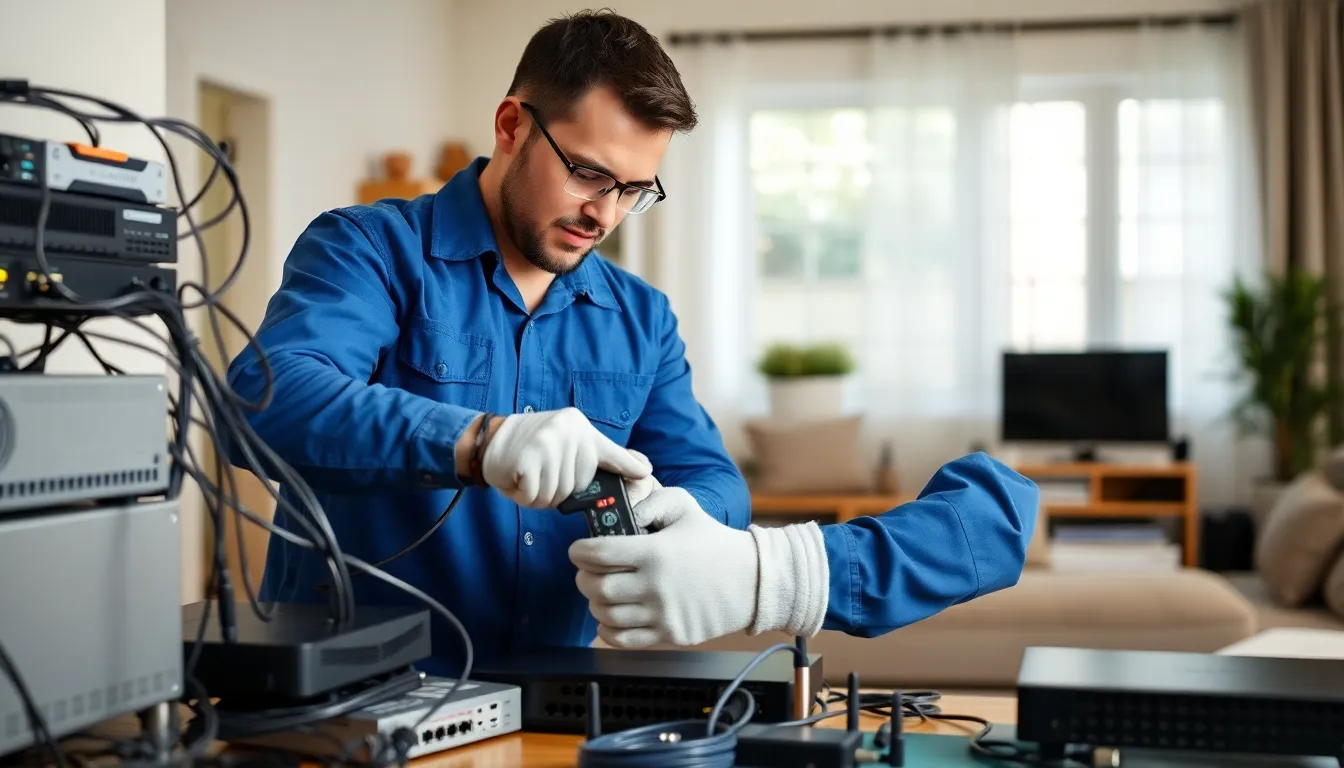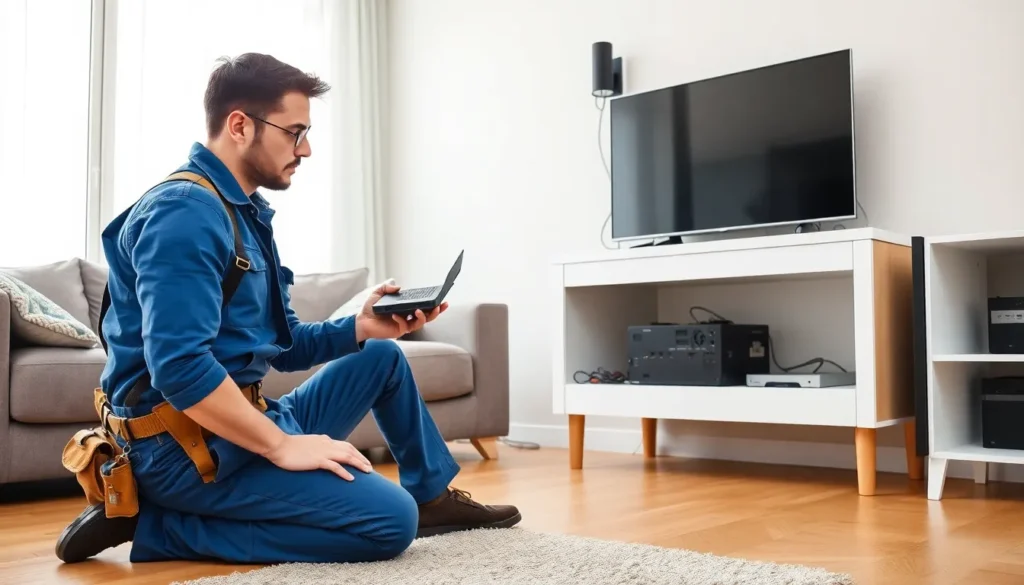In today’s digital age, a reliable home network isn’t just a luxury; it’s a necessity. Imagine streaming your favorite show while your kids are gaming and your partner’s video conferencing—all without a hitch. Sounds like a dream, right? That’s where professional home networking installation services come in, turning your chaotic Wi-Fi situation into a seamless online experience.
Table of Contents
ToggleOverview of Home Networking Installation Services
Home networking installation services provide essential support for creating a functional and reliable internet environment. These services encompass various tasks, including the setup of routers, switches, and access points, ensuring seamless connectivity throughout the residence. Experts assess specific needs, determine optimal equipment, and design layouts that maximize coverage.
Installation services address key issues faced by homeowners, such as dead zones and slow internet speeds. Skilled technicians configure devices to enhance performance, prioritizing both security and user-friendliness. Proper installation not only improves connectivity but also streamlines management through advanced features like parental controls and guest networks.
Costs for home networking installation services can vary, reflecting the complexity of the setup and equipment used. On average, homeowners might expect to pay between $100 and $300 for professional services, depending on the scope of work. Many providers also offer ongoing support, ensuring that users can resolve issues as they arise.
The integration of smart home devices often plays a significant role in modern installation services. Technicians can assist in connecting lighting, thermostats, and security systems to the network, creating a cohesive smart home experience. This approach ensures robust performance while facilitating easy control from various devices.
Customer satisfaction frequently hinges on the quality of installation and support provided. Homeowners benefit from service guarantees, which often cover equipment and labor, providing peace of mind. Choosing professional services fosters a reliable network foundation, enabling enhanced streaming, gaming, and video conferencing capabilities.
Importance of Professional Installation

Professional installation of home networking services plays a vital role in establishing a dependable and efficient internet environment.
Benefits of Expert Services
Expert services ensure optimal performance of network systems. Technicians identify specific needs and choose appropriate equipment for individual homes. Thorough assessments lead to customized solutions that enhance signal strength and coverage throughout the property. Professionals address issues such as dead zones and slow connectivity effectively. Many experts implement advanced network designs, which promote seamless streaming, gaming, and video conferencing. Customers also benefit from ongoing support that provides troubleshooting and maintenance services. This assurance adds peace of mind and enhances satisfaction with home network performance.
Common Mistakes to Avoid
Common mistakes occur during DIY installations. Improper placement of routers can create weak signal areas. Skipping essential equipment like switches or access points may lead to performance issues. Incorrectly configuring network settings may invite security vulnerabilities. Oversights in cable management can cause clutter and signal interference. Users often forget to conduct thorough speed tests after setup, leaving potential issues unchecked. Professionals help avoid these pitfalls by applying their knowledge and experience, ensuring a functional and reliable network system. Each mistake carries risks that can significantly impact overall internet reliability and user experience.
Types of Home Networking Solutions
Home networking solutions include various types that cater to different needs and preferences, ensuring users get optimal performance and coverage.
Wired vs. Wireless Networks
Wired networks offer stability and speed, connecting devices through Ethernet cables. This type of network suits homes with high bandwidth demands and minimal interference. On the other hand, wireless networks provide flexibility and convenience, allowing devices to connect without cables. Wi-Fi installations excel in homes where mobility is essential. Both options can coexist, providing an ideal balance of speed and accessibility for diverse user requirements.
Smart Home Integration
Smart home integration enhances connectivity by linking various smart devices to the main network. This feature allows users to control lights, thermostats, and security systems seamlessly from mobile applications. Professionals ensure proper configuration and compatibility between devices for a smooth experience. Effective smart home setups prioritize security, maintaining user privacy and data protection. With the increasing popularity of smart technology, integration becomes an essential aspect of modern home networking solutions.
Choosing the Right Service Provider
Selecting the appropriate service provider is crucial for achieving a reliable home network. Evaluating options ensures a smooth and effective online experience.
Factors to Consider
Reputation plays a significant role in choosing a provider. Look for companies with positive customer reviews and testimonials. Experience matters; providers with years in the industry are likely to deliver better service. Certifications and qualifications demonstrate a provider’s expertise and knowledge of network technology. Comparing costs between providers highlights differences in service offerings. Check if they provide ongoing support and maintenance, as this can enhance long-term usability.
Questions to Ask
Inquiring about the installation process is essential. Ask how they assess specific needs before beginning to work. Clarifying equipment recommendations helps understand if they’re recommending the best devices. Understanding the timeline for project completion provides insight into how quickly the work can be done. Discussing warranty options can reveal if any guarantees are available on services and equipment. Lastly, determine if they offer post-installation support, ensuring users receive help when needed.
Cost Considerations
Home networking installation services typically range from $100 to $300. Pricing often depends on setup complexity, such as the number of devices integrated and the network’s specific layout. For example, a basic installation might involve a single router setup, while a more intricate arrangement could include multiple access points and switches across a larger home.
Ongoing support from service providers can influence total costs. Many companies offer maintenance plans that ensure system updates and troubleshooting assistance. When evaluating overall expenses, it’s essential to consider both initial setup costs and any recurring fees associated with support services.
Smart home device integration contributes to the overall expense. Incorporating devices such as smart speakers and security cameras may require additional equipment and expertise, which can increase installation costs. These devices enhance user experience, but factor in these additional expenses for a comprehensive budget.
Quality of service affects cost as well. Top-rated professionals often charge more but provide expertise that minimizes issues associated with improper installations. Choosing experienced technicians who guarantee customer satisfaction can lead to a more stable network.
Additionally, some service providers include warranties or satisfaction guarantees. These guarantees offer reimbursement or resolution in case of setup failures. Exploring these options ensures adequate protection and peace of mind for homeowners investing in networking services.
Overall, understanding the complete financial picture helps with decision-making. Homeowners should assess individual needs and preferences against potential costs to select the best service provider for their networking installation.
Investing in professional home networking installation services can significantly enhance the digital experience at home. With expert guidance and tailored solutions, homeowners can achieve optimal connectivity and performance. This not only addresses common issues but also future-proofs the network for evolving technology needs.
Choosing the right service provider is crucial for ensuring a seamless installation process. By considering reputation, experience, and ongoing support options, homeowners can make informed decisions. A well-installed network not only boosts productivity but also enriches leisure activities, making it an essential aspect of modern living.








